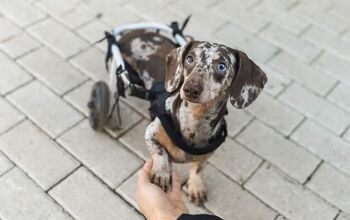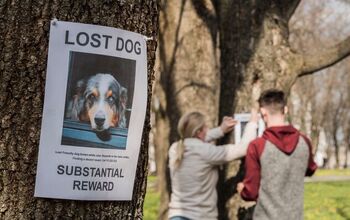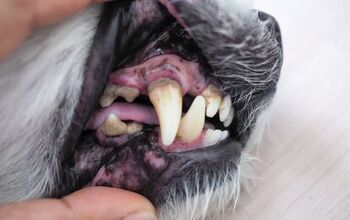Speaking Up About Deafness in Senior Dogs

Much like humans, dogs sometimes develop hearing loss as they get older – it can also be the result of a medical problem in some cases. As your senior dog starts to lose his hearing, he may have trouble following commands and it could impact his quality of life. If your dog is starting to go deaf, you may need to make some adjustments to his lifestyle to accommodate for the loss of his hearing.
What are the Signs of Deafness in Dogs?
When a dog starts to lose his hearing, there are not always any obvious signs. For many dogs, hearing loss happens slowly over time. Some common signs of hearing loss in dogs include unresponsiveness to commands and to the dog’s own name. Your dog may no longer respond to the sound of his favorite squeaky toy and he may no longer respond to loud or unexpected noises. Aside from old age, there are many things which can contribute to hearing loss in dogs.
Related: Mobility Aids Help Senior Dogs Keep Moving
In some cases, it is simply a matter of sound not reaching the nerves inside your dog’s ear – this can be caused by inflammation of the inner or outer ear which may be caused by a tumor, a ruptured ear drum, or other anatomical changes inside the ear. Some dogs even develop hearing loss as a result of certain drugs or toxins like chemotherapy drugs, antibiotics, diuretics, or heavy metals.
How Can You Help Your Deaf Dog?
In some cases, hearing loss in dogs can be reversed. If your dog’s hearing loss is due to old age, however, there may not be anything you can do. Even if you can’t reverse your dog’s hearing loss, however, you can help him adjust to it. If your dog hasn’t completely lost his hearing yet, you can condition him to respond to a disaster whistle – a whistle that is twice as loud as a normal mouth-blown whistle.
Related: 5 Age-Old Facts About Senior Dogs Dietary Needs
You can use the whistle if you need to recall your dog quickly such as for his own protection if he is wandering too close to moving cars. You can also train your dog to respond to hand signals instead of verbal cues. You can do so by using positive reinforcement training methods to help your dog associate a particular signal with a specific response, using treats to reinforce his understanding.
In addition to training your dog to respond to different cues after his hearing loss, you may also need to run interference with your dog at home and out in the world. Always keep your hearing-impaired dog on a leash when you take him outside so that he doesn’t accidentally put himself in a dangerous situation.
You may also need to be extra understanding with your deaf dog – he may not respond as quickly as you like to your cues and commands because he cannot hear them. Be patient with your dog and be careful not to startle him as well – make sure your dog sees you before you touch him or condition him not to startle when touched from behind.
Just because your dog is getting older and losing his hearing doesn’t mean that he is any less deserving of your love and attention. Your dog is still your faithful friend and companion – he just might need a little help and some extra grace on your part.

Kate Barrington is the loving owner of two cats (Bagel and Munchkin) and a noisy herd of guinea pigs. Having grown up with golden retrievers, Kate has a great deal of experience with dogs but labels herself a lover of all pets. Having received a Bachelor's degree in English, Kate has combined her love for pets and her passion for writing to create her own freelance writing business, specializing in the pet niche.
More by Kate Barrington






![This Deaf Pup is What Doggie Determination Looks Like [Video]](https://cdn-fastly.petguide.com/media/2022/02/16/8225999/this-deaf-pup-is-what-doggie-determination-looks-like-video.jpg?size=350x220)
















